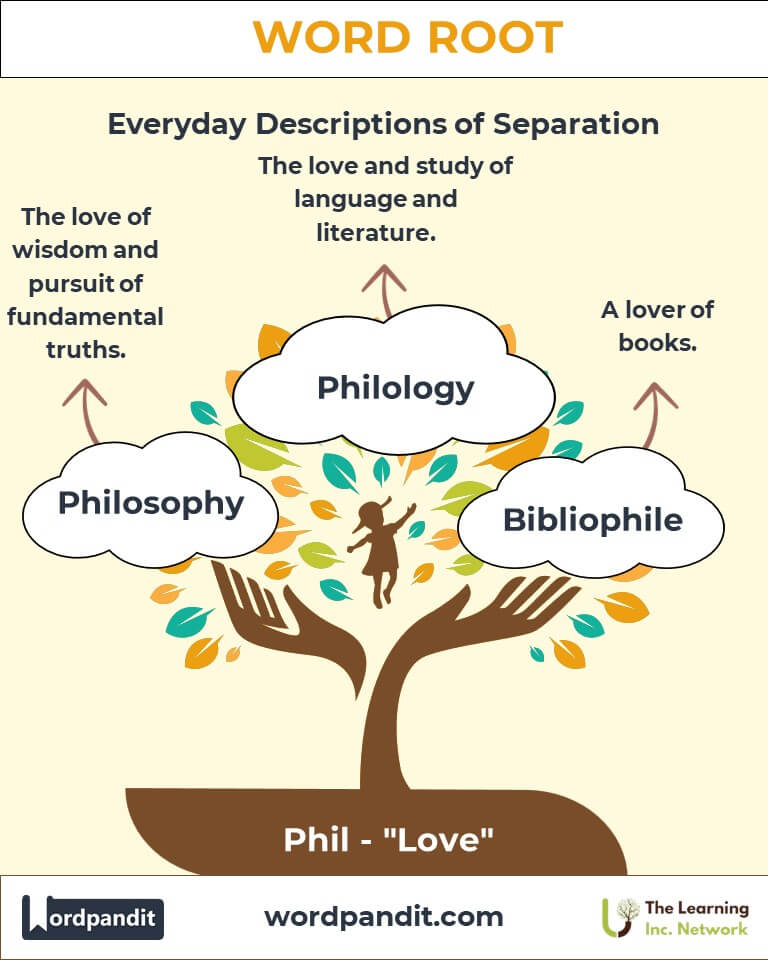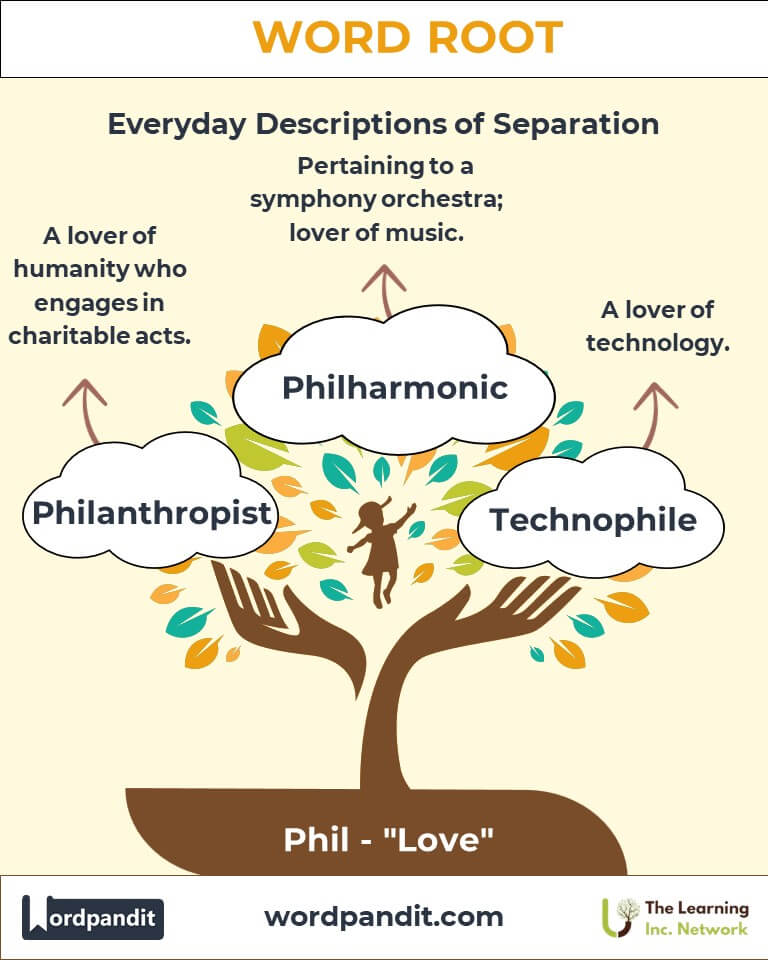Phil: The Root of Love in Language and Culture
Discover the charm of "Phil," a Greek root meaning "love," which forms the foundation of words like "philosophy" and "philanthropist." This article explores its deep linguistic and cultural significance, showcasing its timeless appeal across fields.

Table of Contents
- Introduction: The Many Faces of "Phil"
- Etymology and Historical Journey
- Mnemonic: Unlocking the Power of "Phil"
- Common "Phil"-Related Terms
- "Phil" Through Time
- "Phil" in Specialized Fields
- Illustrative Story: "Phil" in Action
- Cultural Significance of "Phil"
- The "Phil" Family Tree
- FAQs about the "Phil" Word Root
- Test Your Knowledge: "Phil" Mastery Quiz
- Conclusion: The Universal Power of "Phil"
Introduction: The Many Faces of "Phil"
"Phil" (pronounced fil) is a word root from Greek, meaning "love." It represents affection, admiration, and passion. From philosophy (the love of wisdom) to philanthropy (the love of humanity), "Phil" unites a variety of concepts under the banner of love. Its versatility and emotional resonance make it a cornerstone of meaningful expression.

Etymology and Historical Journey
The root "Phil" originates from the Greek verb philein, meaning "to love." Ancient Greek culture revered love in various forms—intellectual, spiritual, and altruistic. Over time, this root merged with others, giving rise to terms like philosophy (love of wisdom) and bibliophile (lover of books), reflecting humanity's evolving passions and pursuits.
Mnemonic: Unlocking the Power of "Phil"
Imagine a bibliophile—a lover of books—sitting amidst a sea of volumes, lost in joy.
Mnemonic: "Phil finds love in everything, from wisdom to books and beyond."
Common "Phil"-Related Terms
- Philosophy (fi-los-uh-fee): The love of wisdom and the study of fundamental truths.
Example: "Her philosophy of kindness inspired everyone she met." - Philanthropist (fi-lan-thruh-pist): A lover of humanity who engages in charitable acts.
Example: "The philanthropist funded schools to improve education." - Bibliophile (bib-lee-uh-file): A person who loves books.
Example: "The bibliophile treasured her rare collection of first editions." - Philharmonic (fil-har-mon-ik): Pertaining to a symphony orchestra; lover of music.
Example: "The Philharmonic Orchestra performed a magnificent concert." - Technophile (tek-noh-file): A lover of technology.
Example: "The technophile eagerly awaited the latest smartphone release."
"Phil" Through Time
- Philhippic (Historical): An old term for a lover of horses, now rarely used.
- Philodox (Archaic): Describes someone who loves their own opinions excessively.
- Philogeant (Obsolete): A term for someone who loves all good things, reflecting a generous spirit.
"Phil" in Specialized Fields
- Education and Philosophy: Philosophy—the pursuit of knowledge and wisdom—shapes academic curricula worldwide.
- Music: Philharmonic refers to orchestras that cultivate a love for classical music.
- Technology: Technophile highlights the growing affinity for innovative gadgets and tools.
- Literature: Philology represents the love and study of language, literature, and their histories.
Illustrative Story: "Phil" in Action
In a bustling city, an aspiring philosopher named Elias spent his evenings pondering life's great questions. Inspired by ancient Greek texts, he started a community group to discuss philosophy. Across town, a philanthropist hosted a fundraiser for local schools, while a bibliophile spent her day immersed in rare manuscripts. Despite their different paths, all shared a connection to "Phil"—a love that unites and inspires.
Cultural Significance of "Phil"
The root "Phil" is woven into the fabric of human culture. From ancient Greek philosophies that celebrated wisdom and virtue to modern philanthropy that uplifts communities, "Phil" reflects humanity's capacity for affection and connection. Its influence spans literature, music, and even technology, underscoring its universal appeal.

The "Phil" Family Tree
- Amor- (Latin: "love"):
- Amorous: Pertaining to romantic love.
- Amity: Friendship and harmony.
- Storg- (Greek: "family love"):
- Storge: Natural affection, as between parents and children.
- Eros- (Greek: "romantic love"):
- Erotic: Relating to romantic or sexual desire.

FAQs about the Multi Word Root
Q1: What does "multi" mean?
A: "Multi" means "many" or "much." It is derived from the Latin root multus, signifying abundance or plurality. This root is used in various disciplines to emphasize multiple components, such as in "multicellular" (having many cells) or "multilateral" (involving many parties or sides).
Q2: How does "multi" differ from "poly"?
A: While both "multi" and "poly" mean "many," they originate from different languages. "Multi" is from Latin, while "poly" is from Greek. The two roots are used in different contexts, such as "multicolored" (Latin influence) versus "polygon" (Greek influence), which means a shape with many sides.
Q3: What is a common use of "multilateral"?
A: "Multilateral" is frequently used in diplomacy to describe agreements or discussions involving multiple countries or parties. For example, a multilateral trade agreement might include several nations collaborating to establish common trade practices.
Q4: How does "multi" appear in scientific terminology?
A: In science, "multi" is widely used in terms such as "multicellular" (organisms with many cells) and "multiplication" (an arithmetic operation involving repeated addition). It emphasizes the existence or involvement of multiple components or entities in scientific phenomena.
Q5: What is the significance of "multiply"?
A: "Multiply" comes from the Latin multiplicare, meaning "to fold many times." It signifies the process of increasing numbers, quantities, or amounts by combining them repeatedly, whether in arithmetic, biology, or general usage (e.g., multiplying resources to meet demand).
Q6: Is "multi" relevant in modern technology?
A: Yes, "multi" appears in technological terms like "multimedia" (the integration of text, audio, and video) and "multitasking" (performing multiple tasks simultaneously). These words reflect the dynamic and multifaceted nature of technology in modern life.
Q7: How is "multi" connected to globalization?
A: The root "multi" appears in terms like "multinational," which describes corporations or entities operating across multiple countries. This reflects the interconnected nature of today’s global economy and the importance of cultural and economic plurality.
Test Your Knowledge: Multi Mastery Quiz
1. Which term refers to companies operating in multiple countries?
2. What does the root "multi" mean?
3. What does "multilateral" relate to?
4. Which term describes simultaneous tasks?
5. What is the meaning of "multiverse"?
Conclusion: The Universal Power of "Phil"
"Phil" is more than a word root—it's a reflection of human emotion and intellectual curiosity. Its applications, from philosophy to philanthropy, reveal the depth of our passions and connections. As we continue to explore and create, "Phil" will remain a symbol of love in its many forms. Let it inspire you to embrace and share your passions!















PHILOGAMY= love for Marriage
I would like to add a New word,” PHILOGAMY= LOVE FOR MARRIAGE.
MISOGAMY= HATRED OF MARRIAGE.
I love wordpandit